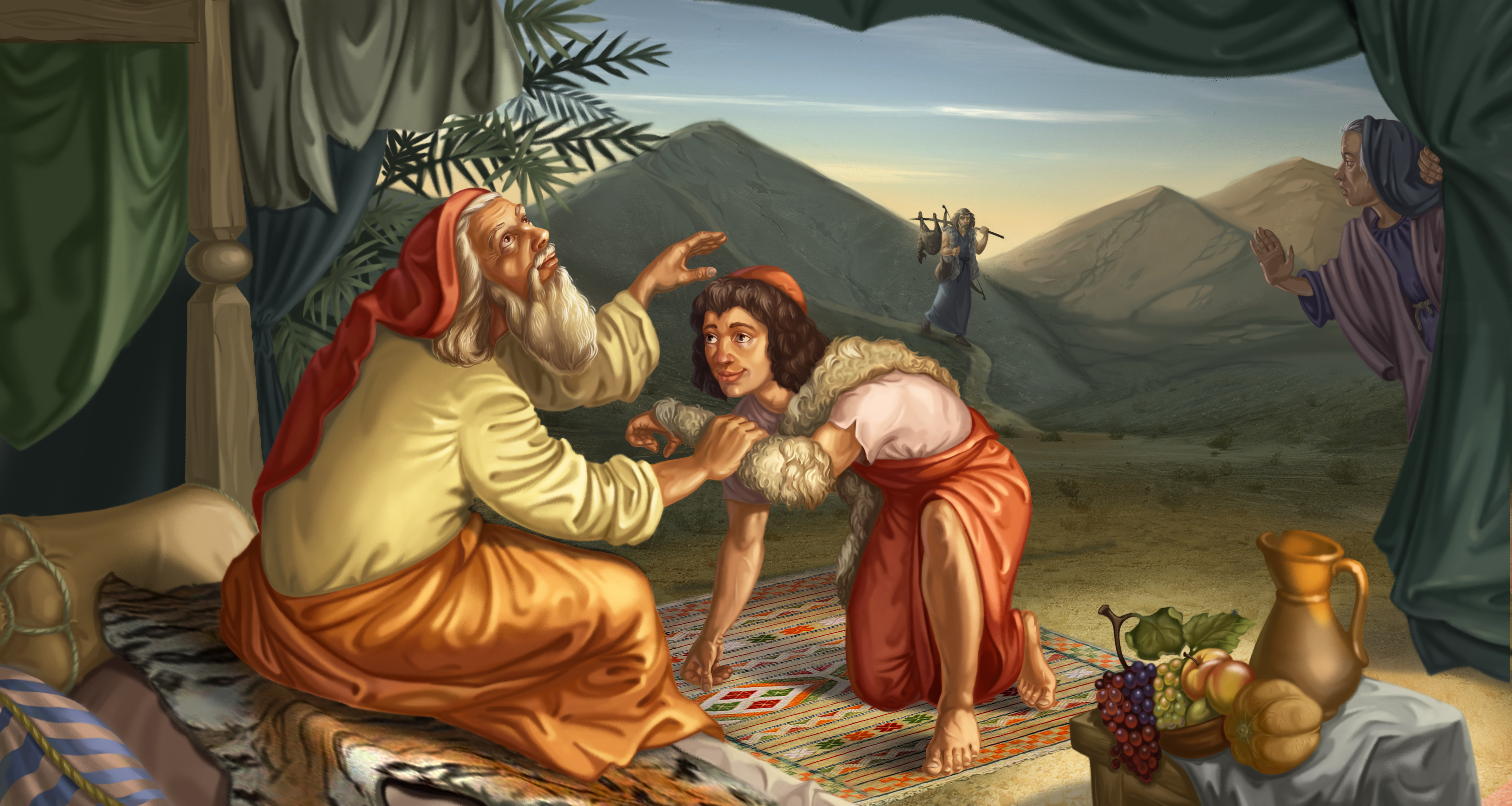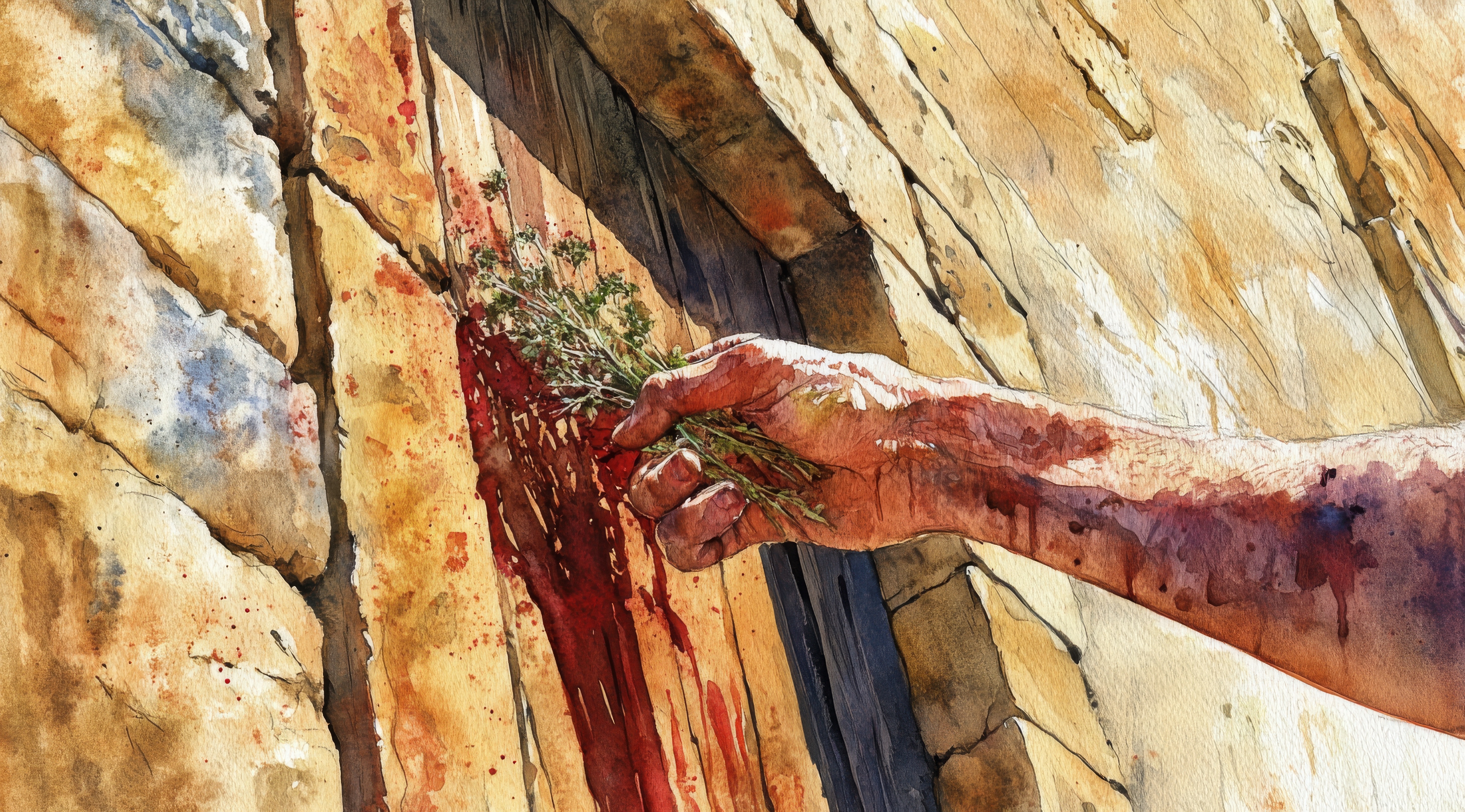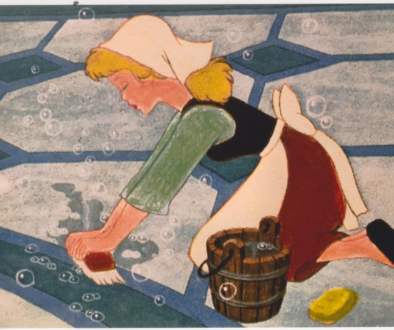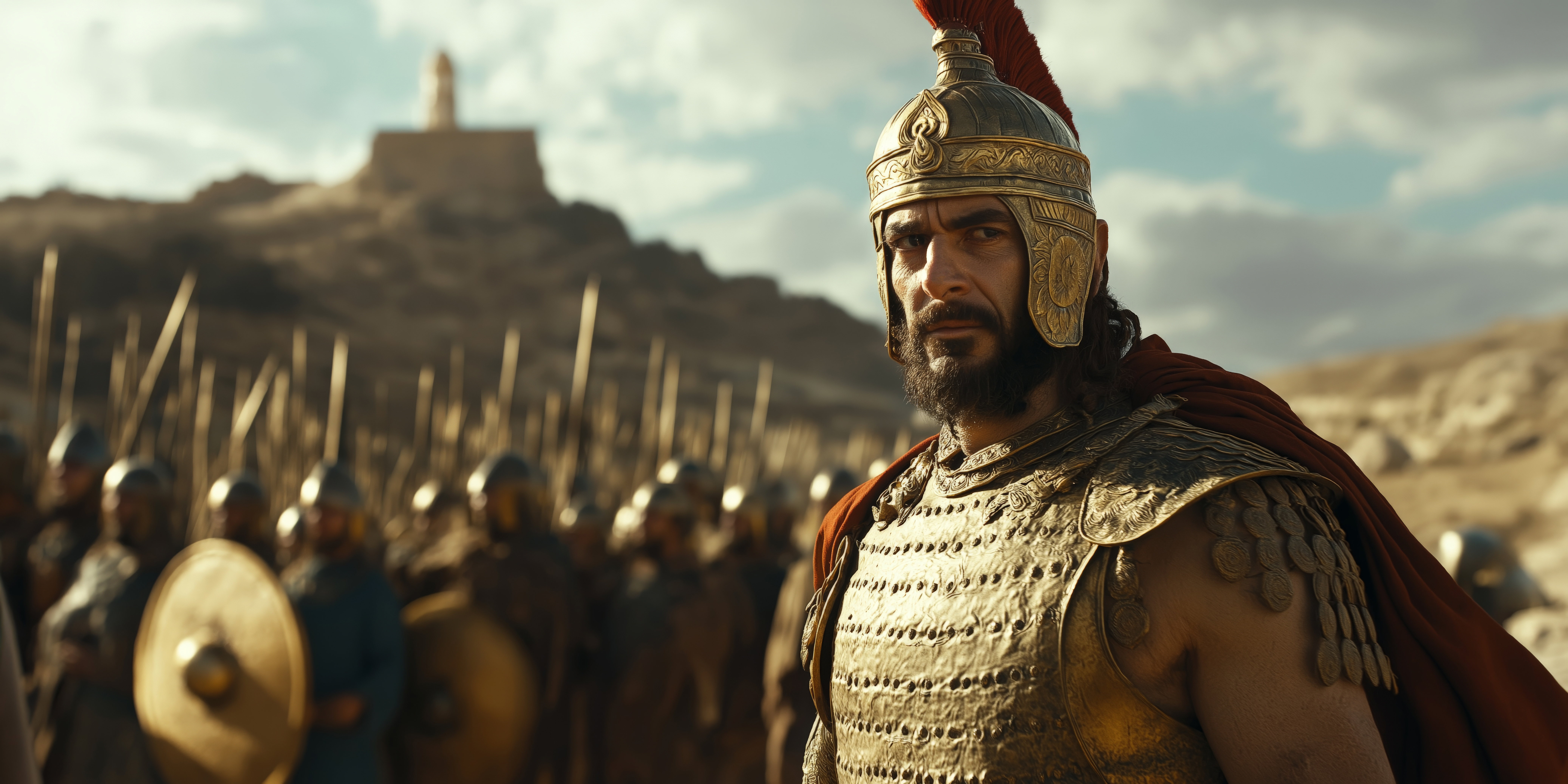Genesis 27 Stolen
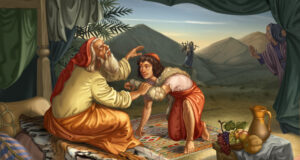
Isaac believes he is nearing the end of his life. He calls Esau to bless him, as his eldest and favorite. That blessing is stolen by Jacob, his youngest and God’s choice.
From the time the twins were conceived, Rebekah knew that “the younger would rule the older.” God is the one who told her this. She sees an opportunity to ‘help God’ in this process. This story is favoritism and sibling rivalry at its lowest. But God already KNEW what was going to happen. He had a plan, and even man’s ‘meddling’ wouldn’t mess it up.
We left our story of Esau and Jacob the last time where Esau had taken two Hittite wives who made Isaac and Rebekah’s lives “bitter.” Rebekah did NOT like the Hittite women! We are not told why, but we know that her dislike of them is supported by her husband.
We are getting ahead of today’s portion of our story. Today, we look at Isaac, as he thinks he is dying. He isn’t. He still has MANY years to live after he gives his blessing to the ‘wrong son’. He must have had a lingering illness. We will check out the math later. For now, let’s join this fractured family as the events unfold.
♥ ♦ ♥
It has been years since Isaac felt his full vigor. Esau’s wives and Rebekah’s hatred of them has not helped. He’s tired and weary of life. He can’t see. He can’t get around without help. He is stuck in this tent all day with someone waiting on him hand and foot. This winter has been especially hard on him, robbing him of all his strength.
“I’m dying” he tells himself. But before he dies, he has something to pass on to his son, his eldest son Esau. He knows of Jacob tricking Esau out of his birthright. This puts him second to his brother in inheriting Isaac’s estate upon his death. Isaac loves Esau and wants to pass something special to him. He wants to bless him. To essentially return his status in life above that of his younger brother. He wants to speak a promise over him that his God will honor.
“Rebekah,” calls Isaac.
“I’m here,” she gently answers.
“Sent for Esau. I need to speak with him before I die.”
“It will be done” says Rebekah as she makes her way to the door. Once outside, she calls a servant and tasks them with finding Esau and passing on his Abba’s desire to see him.
Hardly any time passed before Esau appeared at the door of his Abbah’s tent. Rebekah was waiting outside when Esau arrived.
“Good morning, Ima” said Esau as he pressed a quick kiss on her cheek.
“Good morning, Esau. Your Abba is waiting. Go on in.”
Isaac heard Esau’s greeting through the walls of the tent. As soon as Esau steps through the door, Isaac calls out to him. “My son.”
“Here I am,” replies Esau as he draws near to the bed where Isaac lies.
“Behold, I am old; I do not know the day of my death. Now then, take you weapons, your quiver and your bow, and go out to the field and hunt game for me, and prepare for me delicious food, such as I love, and bring it to me so that I may eat, that my soul may bless you before I die” (verses2-4).
Esau’s eyes light up! His Abba wants to bless him. “I’ll be back as soon as I can with your favorite meal.”
Esau hurries from the tent, not even bidding his Ima a good day. With a scowl on her face, Rebekah watches Esau leave. “Jacob should have this blessing. Esau has already wasted his life with those wives of his. And Isaac is sure to put him over Jacob. This cannot be!” reasons Rebekah.
A plan starts to develop in her mind. “Jacob must have this blessing” she tells herself.
Rebekah quickly goes to find Jacob. This is a task that she cannot give to one of the servants. It is a task she must do alone, to ensure complete secrecy. She finds him in the wheat field. Looking around to ensure that no one is close enough to hear them, she approaches Jacob.
“I heard your father speak to your brother Esau, ‘Bring me game and prepare for me delicious food, that I may eat it and bless you before the Lord before I die.’ Now therefore, my son, obey my voice as I command you. Go to the flock and bring me two good young goats, so that I may prepare from them delicious food for your father such as he loves. And you shall bring it to your father to eat, so that he may bless you before he dies” (verses 6b-10).
Jacob looked at his Ima with concern. “Behold, my brother Esau is a hairy man, and I am a smooth man, perhaps my father will feel me, and I shall seem to be mocking him and bring a curse upon myself and not a blessing” (verses 11-12).
Rebekah brushed away Jacob’s fear. “Let your curse be on me, my son; only obey my voice, and go, bring them to me” (verse 13).
Even at the age of 71 he was never being one to refuse his Ima’s bidding, Jacob hurried and did as he was told.
As soon as Jacob appeared with the goats, Rebekah got to work. She made Isaac’s favorite meal and also prepared some bread to go with it. While it was cooking, she quietly slipped inside the tent and got Esau’s best robe. Rebekah kept everyone’s best robes for special occasions in her possession. This way they would always be ready when needed. Rebekah brings it to her nose, and it still smells of Esau. “This will work perfectly” she thinks to herself as she steals back outside.
The next issue to deal with is the difference in her son’s hairiness. Rebekah realized that the skins of the goats she prepared felt a lot like Esau’s skin. She will have to use these skins as they are still supple, whereas a dried skin would be too stiff. She quickly washes the blood from them and hangs them to dry.
By the time the meal is ready, she has her plan fully formed and ready to put into play. “Jacob, come over here.”
Jacob comes to stand by his Ima. “Take off your robe and put this on” instructs Rebekah as she holds out Esau’s robe to him.
While Jacob is changing, Rebekah cuts pieces of the skins. When Jacob is dressed, she fits the pieces of goat skin she has cut over Jacob’s exposed skin, including the back of his neck. She makes sure to secure them, so they don’t slip, and she tucks them under the edges of his garment to hold them in place as well. Once she is finished, she stands back and looks at Jacob. She is satisfied with her work.
“Now take this to your Abba” she instructs as she presses a prepared platter into Jacob’s hands.
Jacob looks at her once more with trepidation.
“Stop worrying. Just do as I have said.”
Resigned to the farce, and hoping it works, Jacob goes to his Abba’s tent. He slips inside the door and calls out. “My father” (verse 18a).
“Here I am. Who are you, my son?” (verse 18b).
Tamping down any doubt, Jacob steps into his role. “I am Esau your firstborn. I have done as you told me; now sit up and eat of my game, that your soul may bless me” (verse 19).
Isaac’s brows knit together. “How is it that you have found it so quickly my son?” (verse 20a).
Jacob wasn’t expecting this question but he quickly comes up with an answer that he believes will please his Abba. “Because the Lord your God granted me success” (verse 20b).
Still puzzling over ‘Esau’s’ presence, Isaac wants further confirmation that this is indeed his son Esau. “Please come near, that I may feel you, my son, to know whether you are really my son Esau or not” (verse 21). He may not be able to see, but he knows his son.
Jacob is grateful for the skins his Ima put on him. He approaches his Abba and puts his hand on his Abba’s. Isaac reaches over with his other hand and puts it on the back of Jacob’s hand. He feels the goat skin and believes it to be Esau’s skin. Isaac’s skepticism decreases a little, but he is not fully convinced. “The voice is Jacob’s voice, but the hands are the hands of Esau” (verse 22b).
Lingering doubt still wars within Isaac. “If only these eyes of mine could see” he thinks. “Then I would know for certain.”
Isaac asks Jacob once again to confirm his identity. “Are you really my son Esau?” (verse 23b).
Fully committed to this plan, Jacob immediately answers. “I am.”
Isaac gives in. His stomach is growling in anticipation of the delicious meal his nose has told it about. “Bring it near me, that I may eat of my son’s game and bless you” (verse 25a).
Jacob helped Isaac into a sitting position and placed the meal on his lap. He placed his Abba’s hands along the edges of the platter to help him locate it easier. Jacob also stood by with wine for his Abba to drink as he desired with his meal. Silence reigned as Isaac ate the meal. It was exactly as he imagined it would be all his favorites.
Once Isaac is finished eating, he wants one more confirmation that this is indeed Esau. He has been devising this last test as he ate. “Come near and kiss me, my son” (verse 26) instructs Isaac.
Jacob removes the platter from his Abba’s lap and then bends down to give him a kiss. As Jacob bends down over his Abba, Isaac inhales deeply. The scent he always associates with Esau fills his nostrils.
“See, the smell of my son is as the smell of a field that the Lord has blessed!” Fully convinced of his son’s identity, Isaac pronounces his blessing on his son. “…May God give you the dew of heaven and the fatness of the earth and plenty of grain and wine. Let people serve you, and nations bow down to you. Be lord over your brothers and may your mother’s sons bow down to you. Cursed be everyone who curses you and blessed be everyone who blesses you!” (verses 27b-29).
Jacob takes in every word of the blessing his Abba has just bestowed on him. He knows that the Lord hears the words of his Abba and honors them. He is glad he has received this blessing instead of his brother Esau. He would not like to serve Esau, but he knew he better get out of there before he was discovered, by his Abba OR his brother.
“Thank you, Abba. I will treasure your words” Jacob says as he picks up the remnants of his Abba’s meal and quickly exits the tent. Jacob rounds the corner and finds his Ima waiting for him. Together they quickly leave the area so they can discuss what has just transpired.
Not two minutes pass before Esau arrives at his Abba’s tent door with the meal he has hunted and prepared. Esau is excited as he enters the tent. This is a moment he has dreamed of for a long time. NOT the death of his Abba, but the blessing he will bestow on him before he sleeps with his ancestors. “Let my father arise and eat of his son’s game, that you may bless me” (verse 31b).
Isaac’s eyes open wide in surprise, and he calls out “Who are you?” (verse 32a), fearing he already knows the answer.
Esau is confused. Why is his Abba asking him this question? Didn’t he send him to the field for this very purpose? Esau answers with just a tinge of apprehension in his voice. “I am you son, your first born, Esau” (verse 32b).
Isaac’s shoulders slump as the realization of what has happened hits him. Rage began to build within him as the weight of this settles fully on him. “Who was it then that hunted game and brought it to me, and I ate it all before you came, and I have blessed him? Yes, and he shall be blessed” (verse 33).
Immediately, Esau KNOWS what has happened. His heart is broken! Stolen; his blessing has been stolen. Esau looses a guttural cry from the very depth of his being. The anguish fills him as he pleads with his Abba. “Bless me, even me also, O my father!” (verse 33b).
Isaac shakes his head. Emptiness fills the place where joy once waited with a blessing for his favored son. Shame at being taken in by Jacob coats him like a garment. “Your brother came deceitfully, and he has taken away your blessing” (verse 35).
With clenched teeth, he spits his acknowledgment of the appropriateness of his brother’s name. “Is he not rightly named Jacob? For he has cheated me these two times. He took away my birthright, and behold, now he has taken away my blessing” (verse 36a).
Esau turns his attention back to his Abba and pleads with him. “Have you not reserved a blessing for me?” (verse 36b).
With a sorrow in his voice, Isaac answers him. “Behold, I have made him lord over you, and all his brothers I have given to him for servants, and with grain and wine I have sustained him. What then can I do for you, my son?” (verse 37).
Desperate for any kind of blessing from his Abba, Esau pleads one more time. “Have you but one blessing, my father? Bless me, even me, O my father” (verse 38).
When no response is immediately given, Esau heart forces its brokenness forth in cries of mourning. Hearing his son’s anguish, Isaac responds with the only thing he can think of; a future with a sliver of hope in the end.
“Behold, away from the fatness of the earth shall your dwelling be, and away from the dew of heaven on high. By your sword you shall live, and you shall serve your brother; but when you grow restless you shall break his yoke from your neck” (verse 39).
“This is no ‘blessing’” Esau thinks to himself. There is nothing he can do. He too, knows of the weight his Abba’s words wield. Esau storms from his Abba’s tent. The meal he had so carefully prepared lies spilt upon the ground. As useless as his blessing.
Isaac falls back on his pillow and weeps. He knows his son’s future, and it is NOT the one he planned for him. But he also knows that Jacob will carry on the promises of God given to Abraham and to himself. For that, at least, he can feel comforted as he waits for death to take him.
Several days go by and the brothers have managed to stay completely away from one another. Jacob heard Esau’s cries, even from across the camp, when he went into their Abba’s tent. He KNEW the reason and the pain behind those cries. He wrestled his guilt away by telling himself two things. First, it was his Ima’s plan and not his own. And second, the Lord had told his Ima from the beginning that HE would rule over his brother. His Ima was simply making sure that the Lord’s promises came to pass. Jacob would NOT say this to his brother though. He knew Esau’s temper and how he carried grudges like treasures. It was best if Esau had time to let this hurt pass.
Esau was still seething. There wasn’t a day that went by that he didn’t revisit the injustice done to him. Bitterness took root and blossomed overnight. He would make sure his brother NEVER had the chance to exercise his blessing. “If he is dead, how will he rule over me? The day when I ‘break his yoke’ is closer than anyone knows” he tells Judith while they are preparing for a hunt. “The days of mourning for my father are approaching; then I will kill my brother Jacob” (verse 41b).
There are ears nearby which hear the words spoken in secret between Esau and Judith. And those ears belong to a servant who is loyal to Rebekah. This servant would report everything to Rebecca.
When Rebecca heard these words, her heart sank. She knew Esau’s temper. And she knew the danger her son, Jacob, was in. She had to do something to get him out of his brother’s reach. It didn’t take long for a plan to develop.
(to be continued)
Finding a stopping place was difficult in this story. I wanted to keep going, but I also wanted to give space to Jacob’s trip. Even the Bible takes a break between Rebecca telling Jacob to run, and Isaac sending him off. I figured backing up just a little bit wouldn’t be a problem.
Something I find interesting, is that Rebecca tells Jacob that he did this to his brother, instead of she did this. Tricking Isaac as they did was her idea, not Jacob’s. It was her plan from start to finish. Jacob even resisted it in the beginning.
One more thing that I noticed is that Isaac never once mentioned his son’s name during blessing. If he had stated, “Esau” instead of “my son”, what would have happened with the blessing? Isaac had his doubts about which son he was talking to until the very end. Once he smelled Esau’s garments, he stopped wondering. If he had held on to his suspicions just a little longer, would he have said Esau’s name in the blessing? And if he had, would Esau have received the blessing, even though he was absent, or would it still have been stolen by Jacob?
No matter how strained Esau and Isaac’s relationship was, Esau wanted his father’s blessing with all his heart. This story reminds me of something I wanted when I was growing up.
My parents would occasionally leave us children alone for some reason. When they did, they would put my older sister in charge. Even if this meant waking her up in the middle of the night. They would tell her where they were going, but knew that she often didn’t remember them talking to her. They actually took to making her repeated at least twice before they would leave. We shared a bedroom, and by the time they got her to repeat where they were going, I was awake. I thought they could easily have told me and left me in charge instead. I would have remembered. And I was easier to wake up. I don’t know if they even considered it. They simply told her because she was the oldest.
I would have been proud to accept the mantle of responsibility. I even usurped that responsibility most of the time, as my sister was unable to make my brothers behave. There was a lot that went on that my parents didn’t know, because “nobody told on nobody, and nobody got in trouble.” Oh the trials of being second born when you feel as if you should be the first.
Father God, You knew what You were doing with Jacob. From the beginning, You had assigned the promise to him; knowing that he would have to reach past his brother for it. I don’t know if this made him stronger, or more devious. Did You allow Rebekah to tell the boys the story of Your conversation with her? Did she instill in Jacob a desire to rule over his brother? Of did he naturally have a desire to ‘be first’? You used it, whatever its source.
My desire to be first was/is part of my makeup. It drove me in all my endeavors to be the best. To stand out. But it also cost me. It took a LONG time for me to learn to be comfortable with where I am. To not have to always be ‘on top’ or ‘in charge’. There are places where I will still shine, but I’m fine with not having to hold everything together and make everything work out just right.
That ‘first place’ attitude also keeps me from asking for help, even when I really need it. “I should be strong enough to do ____ on my own.” Learning to ask for help has been one of my hardest lessons. Thank You for that lesson. Or better yet, for those lessons! It has taken me a LONG time to take that lesson and make it a part of me. I will ALWAYS need YOUR help! And I see how I will ALWAYS need the help of those around me whom I trust. In one way or another. I can’t do it all. And I don’t always have to be first!

